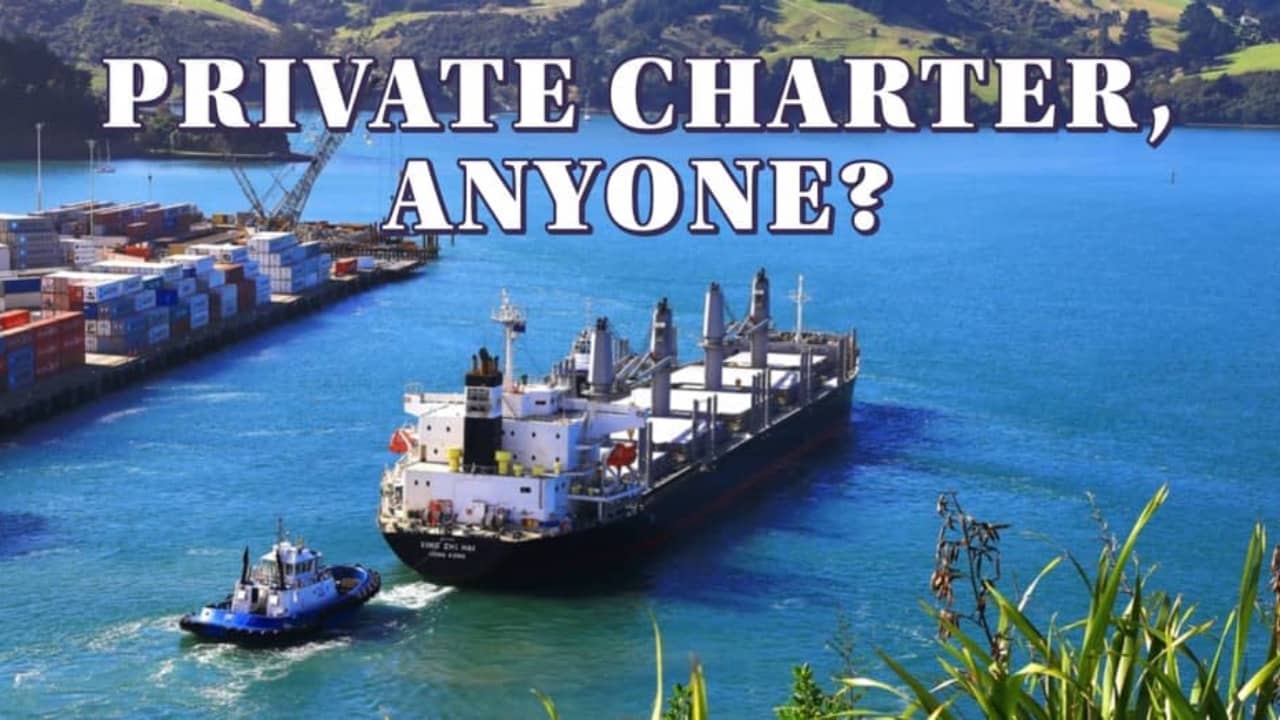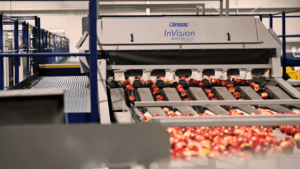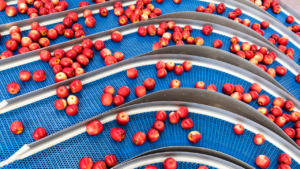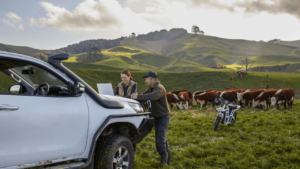
Exporters are Chartering Private Ships as Covid Cargo Crisis Continues
10-minute read (23-minute listen)
Exporters are forced to charter private ships to ferry produce to foreign markets amid Covid driven cargo crisis. Meat producers and fresh fruit and vegetable producers are struggling to get goods to overseas buyers because of the ongoing containership congestion problem.
As more goods are being shipped and delays lay siege to best-by dates, meat company Affco has resorted to chartering private vessels to get exports – valued at close to $120m – to their overseas markets.
The company’s third ship recently set sail from the Port of Tauranga carrying 6,000 tonnes of frozen meat, destined for California and America’s emptying meat aisles.
And it’s not just Affco. Rival meat companies and other primary producers are on board. In fact, half the space in the first export vessel chartered in June last year was taken up by pip fruit exporters.
RNZ is talking to Simon Beale, both logistics manager for Turners and Growers and Chair of the NZ Council of Cargo Owners, and Mark de Lautour, head of Affco Sales and Marketing. Affco has chartered three ships so far. Mark predicts that this predicament is set to continue for three years.
Listen to the full interview here or read the best parts below:
Katherine: Mark, can you start with the shipping scenario New Zealand’s meat exporters were facing that led you to this move?
Mark: It probably started about a year ago. We were looking at what was happening around the world, obviously with Covid and the impact on the global supply chain. We were seeing the trade of goods around the world really increased volumes on the shipping count going up every month.
I guess as no one was travelling and going on holiday, eating out at restaurants, they were all looking to upgrade their TVs and do-up their kitchens, so a lot of product was being traded around the world.
The first issue we saw was that the demand on the shipping lines was increasing, but at the same time, we started to see first problems in the key logistics areas like ports, trucking, warehousing and labour shortages around those areas.
We saw a pinch point coming, and it inevitably did. So we are glad a year ago we started looking at that. It was June last year we jumped onboard the vessel called the Lagoon Phoenix with Turners and Growers, and we went halves with some apples and meat.
Simon: For our business, it’s been quite tough. Since Covid hit, we decided that year to start looking at getting back into charters.
We’ve been out of them for about 5-6 years due to more container services available and also SeaTrader, which used to bring charter ships to NZ, changing to a containerised service, which is now the PAD service run by CMA CGM.
Two years ago, when Covid hit, and we saw ports around the world tightening up and closing down under restricted staff and trucking, we got a vessel in for Europe. Last year, we arranged four vessels – one which we shared with Affco – and then we did another one to the US and two up to the UK and Continent.
We got facilities in our cool store in Antwerp where we pull up outside, and the cool store is around 20 meters away, so it’s a very efficient way of doing things for us.

Katherine: So for you, was it a case of dusting off the old plans, the old charters that ENZA used to do?
Simon: Correct. We used to do over 100 charters a year back in the day, and some of these relied on the services shared with meat companies, especially up to the States.
When Affco and us got together, it worked out well because we both could utilise space to markets where we had limited volume at the time.
Now more exporters are getting together and sharing vessels with other people. We are looking at locking our programme now and doing the same with other primary industries.
So there is a lot better communication between parties and exporters in New Zealand. Also, MPI ran workshops on charters which Mark and I have been part of.
The biggest problem is getting charters these days because many of them are being scraped, and only a few newbuilds are coming on board. Zespri have been lucky to use the new ones on their service to Japan and China.
Katherine: How locked is your access to the charters because, as always, when there is a shortage, the price goes up. Is it going to be the next point of competition?
Simon: Correct. It already is, and there is a lot of vessels going to South Africa and taking products from South Africa up to Europe. This year, the Chilean and South American programmes are quite strong up to the States and other regions.
Charter pricing has gone up, and it depends on who you are and your size, volume, and commitment.
Katherine: Can you give us an indication of what’s it doing, first, to your costs? Second, what’s it going to mean for the price for the consumer?
Mark: From an Affco point of view, this isn’t a cost-saving exercise. It is also the ancillary cost.
One thing I will say is that containers are great. There is a reason that container vessels and container shipping have become the most common exporting method in the world – its convenience and efficiency, and the whole network is built around it, so it’s not necessarily just the charter cost in itself.
It’s the fact that for the 2nd vessel, we put on just over 4000 tones ourselves as Affco. That required that all of our sites build up and stage that volume for one load port over a couple of days of loading. This method relies on you being able to stage, freeze, and hold big volumes that get loaded over a period of time.
Whereas with containers, you can load 20 tones in every container and ship it out every day. So it’s not just a charter cost, it’s the overall cost of holding inventory and managing the trucks.
For example, we had about 24 trucks going back and forth between our sites and the port for the vessel just left Tauranga. And you need to hire those trucks for the whole day, so there are a lot of costs, and unless you can plan it very well, it is not for the faint-hearted when it comes to paying the invoices.
Katherine: Presumably, that will be reflected in the price that the consumer pays and the exports in the first instance?
Mark: 100%. There is no doubt about that. We are not in the game of subsiding our export customers, but we were very keen to come up with a way of getting the product in the market.

Katherine: How exposed are the other parts of the primary sector exporting to a different part of the world? I’m interested in which parts of the world this is working and which parts perhaps it’s not. We’ve got a big export market to China, for example, across various goods. Is this viable?
Simon: We are concentrated mainly on Europe and the States because those are our key markets where there is a lot of congestion. The West Coast of the States is the worst market to get to. Ships are sitting off Long Beach for up to 40 days because they can’t get a birth, so what used to be a 2-3 week transit is now 60 days to get a container.
Zespri have been concentrating on Europe for the last few years and Asia – Japan and China – with a very good network. And you need a good network. You need some good people on either end to put a product on the vessel and get it out efficiently.
Katherine: So Mark, is China or other parts of Asia and the Middle East, for example, challenges for exports?
Mark: China ports have largely held up basically through their extremely strict management of Covid, and they reacted very quickly when they have had outbreaks.
America was definitely the first target for us as they felt full grant of Covid and their infrastructure went down very quickly, so that’s been the primary focus for us at this stage.
We would very much be keen to do it with other markets, but there is so much that has to be done beforehand. That is making sure that port officials are in line, customers are ready to receive 5000-6000 tones of product in one go and maintain that cold chain. It’s quite a long process to go through.
In the US, the infrastructure and the expertise had been retained to some extent. For other markets, such as the Middle East and China, it’s been a generation since frozen meat and bulk carriers have shipped there.
Katherine: Can we talk about the problem with the logistics of containers? As often you end up with containers in the wrong place? It is a very precise mathematical process for ensuring the right number of containers is at the right port at the right time to take products to another port.
Mark: That’s right, you’ve got one hold up in one link of the chain, and then the link ahead empties out, and you have the surge. So what we are experiencing is big blockages in the pipeline.
Simon mentioned 38-40 days vessels have to anchor outside Long Beach before they can get in, so those containers are effectively out of the circulation for a period of time, and that’s the issue.
When you are looking for empty containers to load, and they are sitting at anchor at Long Beach, that’s not really helpful.
The Covid pandemic and the impact around the world doesn’t seem to be going anywhere quickly. Our view is that even if it miraculously disappeared tomorrow, it would probably take a year to 18 months before people decided to jump on the plane and go to Bali for a holiday and spend money on more service-related things rather than goods.
So we think this will last three years and we have to keep going. And it may be that we go longer than that because it’s risk insurance for us. We are a company that exports over 80% of our goods, so it’s our lifeline being able to ship, and there should be a risk mitigation. I think this is probably something ongoing for quite a period.
Katherine: How long is it sustainable?
Simon: It’s about finding more efficiency in the supply chain and infrastructure around New Zealand and around the world and making sure things are flowing efficiently. Getting products from A to B in New Zealand is reasonably difficult. We need better access to ports.
As an example, Port of Tauranga is our main port out of New Zealand and getting consent for extended birth is taking two years to date.
We need more people on the ground in the supply chain around the world, and we need more truck drivers. The USA is short of 100,000 truck drivers. New Zealand is short of around 5000 truck drivers.
With covid happening, the supply chain tightened up and slowed down, and we need to keep things moving. If the container ship is delayed five days and it happens every week, instead of 52 sailings a year, we are getting 40 sailings a year. Everything complies up as we try to get more products out on fewer vessels. So many things around the supply chain need to be looked at to make it more efficient.
Katherine: However, you predict the disruptions will last three years to one extent or another?
Mark: I just can’t see it improving earlier than that. Certainly, this is the period of time we are planning for. Even if container services start improving, space availability improves, and costs come down, likewise, we would probably see the bulk carrier charter rates come down proportionally, but it’s a matter of risk mitigation.

Katherine: Finally, I’ve heard about some smaller producers pulling back on production because they cannot get primary sector goods to market in time. Is that happening in smaller sectors, and is there any support for them?
Simon: We have worked with other pip fruit exporters to put products onboard the vessels we are securing, and we are very open to other parties joining us who hadn’t dealt with T&G for a number of years. Having the same product on the vessel is nice and easy if we had to change temperatures. Things like that might get a bit harder for smaller volumes of product.
Katherine: What else would help? For example, do you feel your supply chain business is sufficiently supplied with RAT’s? I know there are a lot of issues with the supply of rapid antigen tests at the moment. Is that another concern you have for your domestic industries?
Mark: From my point of view, I’m more concerned about the infrastructure side of it, such as the New Zealand ports, trucking companies and the likes. We have pretty strict protocols internally, and we can control our destiny to some extent.
It’s more the ancillary part of the industry that’s probably the main concern. We’ve seen where the ports have failed around the world, and trucking has become unavailable. I would have been looking around in New Zealand now, ensuring that we’ve got safeguards to keep those ports, warehouses and trucks flowing.
Katherine: Can we speak about the Ports of Auckland, which I understand, had a long-running container upgrade project there. Is it relevant to this situation?
Mark: From an export perspective, our main ports are Tauranga, Wellington, and down the South Island. Auckland is the main import port, and it has its challenges. It’s probably one that people drive past in Auckland and see the mountain of containers built up. That’s largely symptomatic of the bigger picture rather than necessarily the Auckland port challenges.
Katherine: Is the internal supply chain of getting products around the country in each of your industries flowing smoothly, or is that also providing some issues with container logistics?
Mark: I suspect we are about to see that. To date, New Zealand’s Covid response has allowed those key industries to keep going, but I think there are challenging times ahead on that front.
Katherine: What do you believe is the impact of an Omicron peak in March and an outbreak that continues perhaps for two months or more?
Simon: That could affect everything from harvesting, storage, packing, trucking, ports, so there is a component everywhere that could be affected. That could be very challenging for everyone.
Source: RNZ. This interview transcript was edited for clarity.
P.S. Easy Freight Ltd helps New Zealand importers & exporters to save money on international freight and reduce mistakes by guiding how to comply with Customs and biosecurity rules.
➔ Contact us now to learn how we can assist you.
